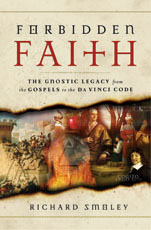"Humanity has been in bondage to masculine values of hierarchy, war, and domination for thousands of years, and now the tide is beginning to turn. The blossoming of interest in the feminine face of God — Mary Magdalene, Sophia, and the Virgin herself, not to mention the Great Goddess of paganism — attests to this fact. Masculine values are receding, and we are witnessing the dawn of a new era of peace, cooperation, and caring.
"There is only one problem with this vision: the contemporary scene does not bear it out. Even if we simplistically equate masculinity with dominance and femininity with caring and compassion, we see less and less of the latter in society, supplanted by an ever more pervasive profit motive. In much of the developed world, the 'nanny state' of the mid-twentieth century, which was intended (with whatever degree of success) to provide a level of support for all citizens, is being replaced by a laissez-faire system that assumes that the market forces will somehow establish social justice.
"Thus, the resurgence of the Divine Feminine may represent, not a swinging of the pendulum in the other direction, but what psychologists call compensation. The more the virtues associated with femininity — caring, beauty, compassion — are trampled down in the culture at large, the more they make their presence felt at an unconscious level. In individuals this manifests in dreams and neuroses, while at a collective level, it manifests in spontaneous and inexplicable occurrences (such as the numerous Marian apparitions) as well as in works like The Da Vinci Code that seize the popular imagination. Thus these evidences of the Divine Feminine may represent not the dawning of a brilliant new age but a coping mechanism for our contemporary discomfort. . . .&bnsp;
"The Da Vinci Code belongs to the genre of detective fiction, and like all such books, it is driven by the hero's need to find out the facts: the culprit in the murder, and ultimately the alleged cover-up of the central truths of Christianity. But part of the book's magic is that it leads the hero (and implicitly the reader) to something beyond factual knowledge: it culminates in a quasi-mystical experience. 'For a moment,' we read at the end, 'he (Langdon) thought he heard a woman's voice . . . the wisdom of the ages . . . whispering up from the chasms of the earth.'
"Thus, The Da Vinci Code culminates in a dimension of experience that goes beyond dates and times and personages. Its facts, as we have seen, are shaky. But in the end, what would it matter if Jesus was married to Mary Magdalene or not? What difference would it make if they had descendents who have survived to this day? At this point in history, it would be practically impossible ever to find out. But the need for awakening to a higher consciousness is not false or fictional. By suggesting that the way to this experience is still open, The Da Vinci Code, for all its faults, has made a great contribution to the discourse of our time."
